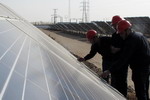HK plans 'bridge building' to boost yuan internationalization
Updated: 2011-11-05 08:26
(China Daily)
|
|||||||||||
HONG KONG - In its role as a testing ground for the internationalization of the renminbi (RMB), Hong Kong is successfully building three "bridges" linking the onshore and offshore yuan markets, a senior Hong Kong official said.
"What we are trying to do here is to link the very big onshore market - the RMB-denominated (market) - with the offshore market," said Norman Chan, chief executive of the Hong Kong Monetary Authority (HKMA).
Chan was speaking on Friday at the China Daily Asia Leadership Roundtable on "Hong Kong's Vision and Strategies for RMB Internationalization", which brought together five prominent financial and economic figures, who shared their views and insights on the process of yuan internationalization with more than 170 delegates from different institutions and organizations.
The link has been established by building three bridges: the "trade bridge"; the "direct investment bridge"; and the "portfolio investment bridge", said the HKMA chief.
The first bridge, the "trade bridge", which is now more or less complete, allows overseas companies to settle their trade with mainland partners in yuan.
The "direct investment bridge", which is being built rapidly, allows foreign direct investment into the mainland with yuan raised in the offshore market. It also allows mainland companies to invest in overseas markets with onshore yuan capital. "I would expect more and more companies will make use of this new bridge to make investments in China," Chan said.
Another bridge - the "portfolio investment bridge" - which is being built gradually, allows offshore yuan to enter and be invested in the mainland's financial markets.
"We're implementing those three bridges," said Dicky Yip, executive vice-president of Bank of Communications Ltd. "We have customers crossing those three bridges everyday."
With all the bridges gradually coming together, the next step for the development of Hong Kong into the "premier" offshore yuan business center is to boost its "traffic". This, essentially, is the process of building a "critical mass".
The concentration of financial products, market liquidity and financial intermediaries create inertia to conduct financial transactions through the established center, HKMA Deputy Chief Executive Peter Pang said of the "critical mass" during a speech in late September.
Hong Kong has the edge in this regard. "We have unique advantages being part of China and being a very major commercial, trading and financial center ourselves," the HKMA's Chan told the audience on Friday. "We also have the first-mover advantage in promoting the renminbi businesses in Hong Kong."
"The real advantage of Hong Kong is the people in this room," said Ronald Arculli, chairman of Hong Kong Exchanges and Clearing Ltd. "It is the likes of you. We operate bilingually, in Chinese and English."
English is the international language of commerce and there are at least a billion and half people who speak Chinese, "so we have a very distinct advantage," he added.
While the advantages and efforts of Hong Kong will help to promote the internationalization process of the Chinese currency, the pace of the process will still be largely determined by the central government.
The process of yuan internationalization is linked with the issue of the opening of the capital account by the central government, because this will provide a repatriation channel for yuan to flow back to the onshore market, said R. Sean Craig, the International Monetary Fund's Hong Kong Resident Representative.
In addition to the capital repatriation channel, the opening of the capital account may also help the development of the market infrastructure for yuan investment products.
"For example, the development of a yuan-denominated derivatives market is needed to support more offshore yuan business in Hong Kong. The city also needs greater credit-risk analysis infrastructure with reference to yuan-denominated investment products to support local offshore yuan business. These financial infrastructures have to be dictated by the capital account opening in China." Craig said.
However, he expects that the process of capital account opening will be carried out smoothly, otherwise the process may bring unintended risks to the Chinese economy.
"Opening the mainland capital markets requires heavy planning and incremental progress," the HKMA's Chan said.
He Guangbei, the vice-chairman and chief executive of Bank of China (Hong Kong) Ltd, is also looking at the process from a longer-term perspective.
"If you refer the full convertibility of RMB as the fact that the currency can be exchanged into or back to other currencies, and with a full capital flow, then I would say it will take a long, long time. The short convertibility itself may come sooner than people expected," he said.
Related Stories
Experts want steady pace for making RMB international 2011-11-02 13:52
RMB to become one of global reserve currencies: Expert 2011-10-20 11:28
China urges opposition to pressuring RMB exchange rate 2011-10-12 11:20
Yuan advances before meeting of G20 leaders 2011-11-04 10:10
- HK boosts yuan internationalization
- Improved financial governance called for
- Medical and healthcare investment soars
- Emerging markets pad fall in export orders
- GDP growth 'set to slow to 8.5%'
- Currency's value rise 'reasonable'
- Rail ministry pledges to pay off debt
- China's Internet advertising rakes in 14b in Q3










